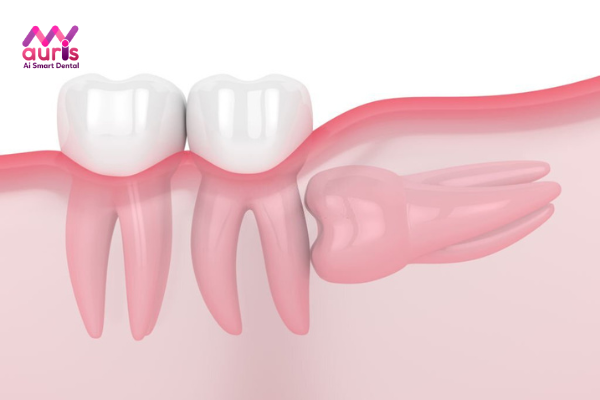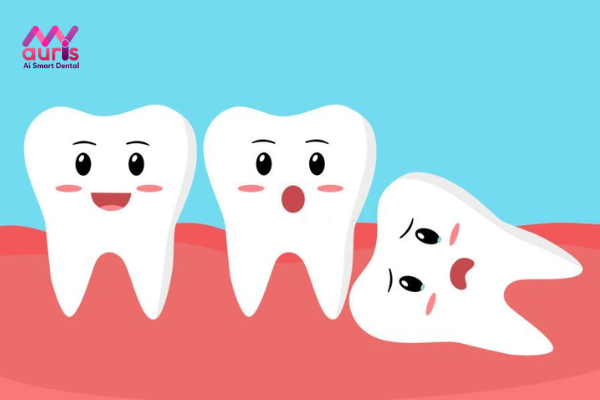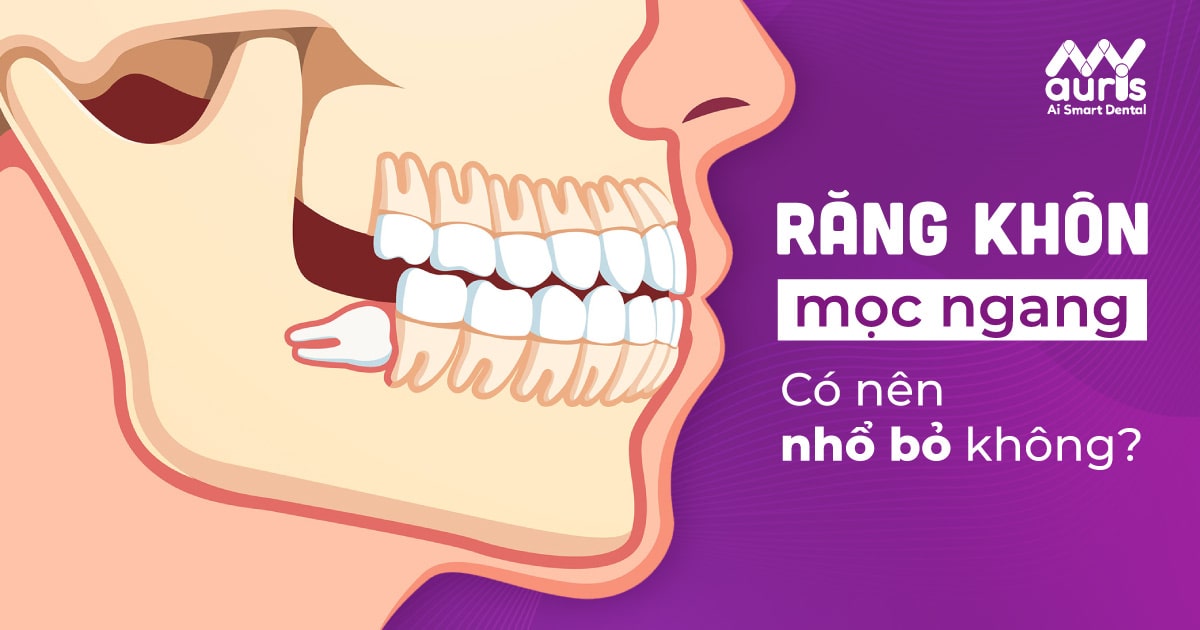Should wisdom teeth growing horizontally be extracted and what are the harmful effects it brings? Currently, wisdom teeth are always a controversial issue because they do not support the chewing process but instead cause discomfort and inconvenience in daily life. For people with abnormally growing teeth, such as wisdom teeth growing horizontally, located deep inside the gums, the pain will be much more severe if not treated early and can cause unnecessary dental diseases. Let’s refer to the information from this article with My Auris dentistry to find the answer for yourself!
What are horizontal wisdom teeth?
Horizontally growing wisdom teeth are teeth that tend to grow perpendicular to the position of tooth number 7, they will show signs of piercing directly into the root of the adjacent tooth. At this time, wisdom teeth grow underground in the gums or jawbone, making it impossible for the patient to see with the naked eye, like in cases where wisdom teeth grow straight or 45 degrees.
The main reason why these teeth grow crooked or horizontal is because wisdom teeth tend to grow around the time the patient is in adulthood, around the age of 18 to 28. age. During this time, the adult jaw has almost fully developed and there is no longer any empty space for teeth to grow normally, so wisdom teeth have to find another direction to grow, leading to the wrong position.

Should horizontal wisdom teeth be extracted? Doctors’ answers
Question “Should horizontal wisdom teeth be extracted?” The tooth extraction process will not be too dangerous or have any impact on the patient if you know how to “Choose to send gold” at a reputable and quality dental clinic. At the same time, it has a team of qualified and experienced doctors. You need to see a doctor to have an X-ray taken to determine the correct position and direction of wisdom tooth growth to have a basis for devising a treatment regimen and applying appropriate techniques. The doctor will provide a detailed treatment regimen and how to well control all developments during the implementation process to bring the best results to the patient. In addition, there must be the support of modern machinery and equipment such as: Ultrasound machine, dental cutter and other accompanying medical tools to ensure the tooth extraction process goes smoothly, safely and without causing complications for the patient.

Symptoms of horizontal wisdom teeth
- The patient can observe signs of redness and swelling in the gums, but the teeth do not. protruding from the gum surface, accompanied by a prolonged feeling of pain
- Because the wisdom tooth grows tilted into tooth number 7, the pain does not only stop at the innermost gum but also shows signs of pain at the position of tooth number 7.
- Growing teeth can affect the entire mouth muscles, causing the teeth to show signs of stiffness, making it difficult for the patient to open their mouth while eating or communicating.
- The patient’s breath has a rather unpleasant odor because the growing wisdom teeth create gaps. making it easy for food particles to get in, causing bacteria to multiply quickly
- Patients show signs of fever when wisdom teeth grow horizontally, the fever can last longer, making the patient more tired.
However that wisdom teeth growing horizontally cannot be seen with the naked eye, but through some of the above symptoms, you can predict your condition and need to quickly go to reputable dental facilities to have the tooth extracted promptly.

Damages that horizontally growing wisdom teeth cause re
Can you endure the persistent pain that wisdom teeth bring for a long time? The answer is impossible because it will make you unable to eat well and your health and spirit will not be guaranteed. Below are some harmful effects that they can bring, to help you understand and find answers to the question of wisdom teeth Should horizontal growth be removed?

Severe impact on tooth number 7
In case wisdom teeth grow horizontally, it will directly hit the root of tooth number 7 and cause it to become loose. lay. The area of the tooth root in contact with the wisdom tooth will be decayed and the pulp will die, increasing the possibility of losing tooth number 7.
Causing misalignment of the entire jaw
When long-term horizontal teeth are not treated quickly, they can cause the adjacent teeth to be pushed and can later affect the position of the entire jaw, even negatively affecting the patient’s bite.
Causing inflammation around teeth
Signs of inflammation around the gum area where wisdom teeth grow will be very difficult to avoid because the gaps are trapped by leftover food particles. At this time, the patient’s gums or cheeks will swell due to inflammation, the most serious of which is the appearance of pus pockets.
The patient has a jawbone cyst
Patients who have horizontal wisdom teeth but refuse to have them extracted in the early stages can cause jaw bone cysts. The tumor grows quite widely and in the long term can damage the jawbone, teeth as well as the nerves around the teeth.
Causing nerve damage
Because wisdom teeth show signs of growing horizontally, there are many surrounding nerves at the location, leading to the risk of compressing the maxillofacial nerves. This not only causes headaches but also affects reflex disorders, loss of feeling of opening the cheeks, lips, tongue, etc.
Hopefully all the information in this article can provide you with answers surrounding the issue of whether horizontal wisdom teeth should be extracted and the unexpected harmful effects. My Auris Dental is always ready to support customers who come for treatment, we are committed to always ensuring the best interests of our customers. Contact via the hotline number to receive advice from a team of professionally trained staff and quickly schedule an appointment.
Yen Nhi





